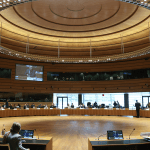The European Investment Bank (EIB) and Zunder, an operator of independent electric vehicle (EV) ultrafast charging infrastructure in Spain, have signed a EUR 40 million loan to finance the installation of a network of fast and ultrafast chargers along the Trans-European Transport Network (TEN-T) in Spain. The project complies with the EU’s sustainable transport and low-emission mobility policy.
With a EUR 40 million loan from the European Investment Bank, Zunder will continue its development plan and accelerate the electrification of road transport in Spain, avoiding almost 1 million tonnes of CO2 emissions between 2023 and 2031. This is all in line with EU objectives such as decarbonisation, sustainable transport and the development of the TEN-T infrastructure.
So, thanks to financial support from Spain’s European Investment Bank, Zunder’s plans to build more than 4,000 ultra-fast charging stations in southern Europe have seen a boost, shortening deadlines and increasing the number of projects in its expansion plans.
Most of the chargers are destined for installation in regions that the EU considers to be neighbouring, i.e. areas with a per capita gross domestic product (GDP) per capita below the EU average, such as Castilla y León, where Zundera has its headquarters. in the city of Palencia. This action thus demonstrates the EIB’s commitment to prioritising projects in Spain and these European regions, contributing to the EIB’s regional cohesion and development objectives.
Ricardo Mourinho Félix, EIB Vice-President, said: “We are delighted to join forces with Zunder on a project to boost electric mobility in Spain. Investing in infrastructure that facilitates electromobility breaks down barriers to the roll-out of electric vehicles and contributes to the decarbonisation of transport, one of the biggest greenhouse gas emitters. As the Climate Bank, we support projects that accelerate the transition to more sustainable mobility, and this operation not only meets this priority, but is also synonymous with innovation and job creation.”
Adina Vălean, European Commissioner for Transport, said: “Large-scale initiatives of this profile are exactly what we envisaged when we included in our Sustainable and Intelligent Mobility Strategy the ambition to have at least one million public charging points on our roads by 2025. We are committed to accelerating the transition to sustainable mobility. We aim to increase investment not only through the Connecting Europe Facility but also with the EIB through the InvestEU programme“.
Daniel Pérez, CEO of Zunder, commented: “This partnership between Zunder and the EIB is a further boost to be able to expand ultrafast charging and be part of the change in the way we move and also contribute to the decarbonisation process in Europe.”
EIB and European Commission support sustainable transport
In 2016, the European Investment Bank and the European Commission launched the Cleaner Transport Facility programme with the aim of promoting the use of cleaner modes of transport and creating the necessary infrastructure for their operation, such as charging and refuelling facilities. As part of the programme, the World Bank financed 15,000 electric and hybrid cars in several European countries, financed clean buses in France and the Netherlands, as well as the construction of thousands of electric vehicle charging stations in Italy, Spain and Slovakia.
The EIB also finances individual projects to promote greener, safer and more affordable transport around the world. The World Bank supports transport integration and decarbonisation in Africa, Asia and Latin America.
This operation is aligned with the EIB’s ‘Transport Finance Policy’, updated in July 2022 following the adoption of the Bank’s Climate Roadmap and the European Green Pact, seeks to support the goals of a carbon neutral Europe by 2050. This policy sets out the most effective eligible investments to address the challenges of the transport sector and thus those that will have the greatest impact on the transformation of the sector towards a more sustainable model. Safe, accessible, green and efficient are the four key and interdependent pillars of sustainable transport. This operation stands out for being linked to the electrification of transport and the development of intelligent transport systems.
Zunder, self-developed technology
Founded in 2017 by Daniel Pérez, Zunder has positioned itself as the leading independent ultrafast EV charging operator in Spain. The company has the support of international investors such as, among others, Mirova, which recently invested €100 million in the company.
The company’s growth is not limited to Spain. In 2022 it began its international expansion, having won its first public tender in France and reaffirming its ambition to deploy and operate more than 4,000 charging points and manage more than 40,000 through its platform by 2025, with an investment plan of €300M for the same period.
Background information:
The Connecting Europe Facility (CEF) is an EU funding instrument designed to boost growth, jobs and competitiveness through targeted infrastructure investments at European level. In addition to the CEF grants managed by the European Commission, the EIB implements the CEF Debt Instrument (CEF DI), a risk-sharing instrument that notably covers the transport and energy sectors. CEF grants and CEF DI may be combined where necessary to support projects.
The Future Mobility facility is a joint initiative of the European Commission and the EIB established under the Connecting Europe Facility (CEF) Debt Instrument, which aims to support Europe’s decarbonisation agenda, with an emphasis on cleaner, safer and smarter transport solutions. The Future Mobility facility can be partially funded by the NER300 programme established by the European Union.
Zunder was founded in 2017 by Daniel Pérez and Lorenzo Antolín in Palencia, Spain. It is the highest-rated independent operator of ultra-fast charging infrastructure in the industry. As part of its international expansion plans, it will soon open its first charging point in France, to be followed by Portugal and Italy. Zunder hopes to be operating more than 4 000 charging points and managing 40 000 through its platform by 2025.
Zunder’s charging network can be used by all types of electric vehicle. Payments can be made via the app, Plug&Charge or an RFID key fob. Contactless payments are also accepted, meaning users do not need to be registered. As a result, it is now the most highly rated charging network among electric vehicle users.
Source: European Investment Bank (EIB)







Leave a Reply